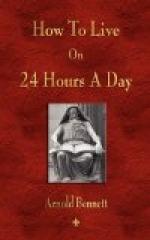Now, shall I blush, or will you?
Do not fear that I mean to thrust certain principles upon your attention. I care not (in this place) what your principles are. Your principles may induce you to believe in the righteousness of burglary. I don’t mind. All I urge is that a life in which conduct does not fairly well accord with principles is a silly life; and that conduct can only be made to accord with principles by means of daily examination, reflection, and resolution. What leads to the permanent sorrowfulness of burglars is that their principles are contrary to burglary. If they genuinely believed in the moral excellence of burglary, penal servitude would simply mean so many happy years for them; all martyrs are happy, because their conduct and their principles agree.
As for reason (which makes conduct, and is not unconnected with the making of principles), it plays a far smaller part in our lives than we fancy. We are supposed to be reasonable but we are much more instinctive than reasonable. And the less we reflect, the less reasonable we shall be. The next time you get cross with the waiter because your steak is over-cooked, ask reason to step into the cabinet-room of your mind, and consult her. She will probably tell you that the waiter did not cook the steak, and had no control over the cooking of the steak; and that even if he alone was to blame, you accomplished nothing good by getting cross; you merely lost your dignity, looked a fool in the eyes of sensible men, and soured the waiter, while producing no effect whatever on the steak.
The result of this consultation with reason (for which she makes no charge) will be that when once more your steak is over-cooked you will treat the waiter as a fellow-creature, remain quite calm in a kindly spirit, and politely insist on having a fresh steak. The gain will be obvious and solid.
In the formation or modification of principles, and the practice of conduct, much help can be derived from printed books (issued at sixpence each and upwards). I mentioned in my last chapter Marcus Aurelius and Epictetus. Certain even more widely known works will occur at once to the memory. I may also mention Pascal, La Bruyere, and Emerson. For myself, you do not catch me travelling without my Marcus Aurelius. Yes, books are valuable. But not reading of books will take the place of a daily, candid, honest examination of what one has recently done, and what one is about to do—of a steady looking at one’s self in the face (disconcerting though the sight may be).
When shall this important business be accomplished? The solitude of the evening journey home appears to me to be suitable for it. A reflective mood naturally follows the exertion of having earned the day’s living. Of course if, instead of attending to an elementary and profoundly important duty, you prefer to read the paper (which you might just as well read while waiting for your dinner) I have nothing to say. But attend to it at some time of the day you must. I now come to the evening hours.




